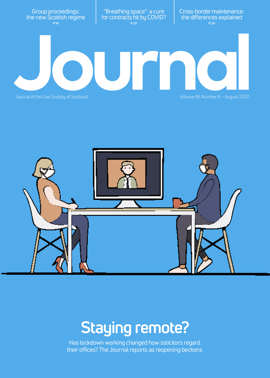In-house: “So, how are you?”

The Law Society of Scotland, in collaboration with the In-house Lawyers’ Committee, recently took the temperature of the in-house community it serves, launching its online survey on 5 June.
The survey attracted over 400 responses, indicating that in these uncertain times, people seem increasingly keen to connect.
In what can feel like a relentless barrage of unsettling news, it might be easy to feel overwhelmed and worried about the future.
Encouragingly, however, the responses appear to indicate that the in-house community is adapting, proactively engaging with evolving work practices and, to an extent at least, flourishing, as we move past the first acute phase of the crisis and look towards the future.
A full report on the survey has been published by the Society: see www.lawscot.org.uk/research-and-policy/research/research/. This article predominantly focuses on key themes drawn from the responses to the survey question: “Please share any positive changes that you or your in-house legal team have seen in relation to your role or working practices as a result of the COVID-19 crisis”, together with my own experiences, personal reflections and impressions on how the in-house community has adapted.
Catching up: technology and flexibility
A key theme emerging is the increased engagement with modern technology as well as the accelerated acceptance of its place at the heart of the effective delivery of legal services in the 21st century.
The fact that most of us have been working from home for the past few months has underlined the importance of having an up-to-date and secure IT infrastructure that can sustain and support remote working on this scale. The value of investing in quality IT support teams and in programs such as Zoom or Microsoft Teams to keep connected is also increasingly recognised as fundamental – no longer a nice to have but an intrinsic part of the job.
While the in-house community to an extent was already up on this curve – with online meetings being a part of the everyday for many – such interactions are obviously now the default, and more time and effort it seems are being invested into making them work effectively.
Indeed, the consensus appears to be that more is being achieved through the online approach and less time and resource wasted. Availability and use of increasingly sophisticated online meeting packages are also assisting in overcoming concerns that might otherwise arise about the lack of ability to read facial signals or body language.
Virtual pub quizzes and team catchups via programmes such as WhatsApp, Twitter or Teams, or use of Yammer, are also tools that are being deployed with greater frequency and commitment across organisations, to ensure that the more social aspect of work is being maintained – enabling many, ironically, to feel more connected to others across the business, not less.
Forced to rethink
Perhaps more notable, however, has been the shifting in the wider legal landscape that in turn has had an impact on our day-to-day work. The practical consequences of lockdown have accelerated changes and encouraged innovations in areas that have, prior to now, seemed to be immovable features of the marketplace, whether in fact always required or not.
Electronic signatures on most documentation has, for example, become more the norm. While the ability to conclude most contracts electronically already existed within the law, it has now entered the mainstream, coupled with an increased flexibility in mindset around the different media that can be used in this respect and around the use of witnesses. Use of encrypted e-signatures also seems set to rise. Law Society of Scotland smartcards, previously considered as not particularly relevant for most and often left to expire, may see a resurgence in value across the profession.
An increased use of the various sophisticated signing platforms that exist, such as DocuSign or Adobe, is also noticeable, as is awareness of the various issues that potentially arise in relation to such platforms, for example in respect of version approval and control.
The opportunities afforded by automated online documentation solutions and portals to save time, facilitate business continuity and hopefully enhance ultimate end user experience, are also increasingly being recognised, explored and deployed.
Even Registers of Scotland and the courts are engaging, now accepting and indeed encouraging online submission of documentation and forms.
While some might say the law in this respect is simply catching up with other disciplines, the reality is that this is still relatively new ground for most, and market practice is developing in real time.
More widespread recognition and acceptance of the advantages of technology and the flexibilities it can offer in legal practice, is however in turn, at least from my own perspective, enabling us to shift the often held perception within our wider organisations that the law can be overly formal and cumbersome.
Necessity, it seems, is indeed proving to be the mother of (re)invention.
Big girls (and boys) do cry (at least sometimes)
There also appears to be something of a more subtle mindset shift across practitioners and many employers.
The realities of working from home have fused our private and professional lives in a way that is unprecedented.
On the one hand, it has afforded, to many of us for the first time, a taste at least of that often elusive concept of work-life balance – whether that is being able to do a spot of exercise in place of the daily commute, the basic satisfaction of putting on the washing machine before work, or the chance to avoid the indigestion-inducing dash to do the nursery drop-off in the morning.
Abiding by lockdown rules has also, however, inevitably meant that the messiness of real life has intruded into the day-to-day. It’s difficult to be overly adversarial or detached in a negotiation, for example, when you are sitting on a patio chair in your bedroom, you have a child hanging around your neck or you have a dog that suddenly decides the postman is his nemesis while you are on a call.
The public sector has always led the way in terms of advocating resonant communication, but even there I have noticed a shift in emphasis in recent times, with most calls starting with “So how are you?” followed by some exchange of personal anecdote on experience of lockdown so far.
In short, there seems to be a deeper awareness and acceptance of the human side of our fellow professionals and colleagues, and flowing from that, a more tolerant and collaborative approach to interacting with each other. There also seems to be, at least at present, a greater acceptance of flexibility in working practices by employers.
It is to be hoped that such behaviour shifts endure far longer than the current crisis, given it is recognised that a collegiate and collaborative approach in general leads to faster and better results and more motivated employees.
A seat at the table
Finally, the crisis has also, it seems, seen an increased rather than reduced demand for legal advice, raising new considerations for in-house lawyers almost hourly in what is often uncharted territory.
The practical challenges presented by COVID-19 have, for example, given rise to an enhanced role for compliance and governance advice across a myriad different business areas, from established ones such as HR/wellbeing, data protection and property to new ones created by the crisis, all of which are having to be considered in real time.
There has also been an increased recognition of the importance of legal advice in relation to new service design within the business. The need for businesses to adapt and interact with third parties speedily and in new ways to survive in the “new normal” has required, and is requiring, creative and agile advice to be given by legal teams, often within very tight timescales. For the first time, it seems, many are recognising the legal team as not just part of the support side of the business but as an intrinsic part of its strategic team.
It remains to be seen whether this approach continues as we emerge slowly from lockdown, but it is to be hoped that in-house legal teams can grasp this opportunity to take their seat at the table in relation to the overall strategic direction of the business in the longer term.
Parting thoughts
In assessing, therefore, the winners and losers of La Vida Lockdown so far, it seems that the in-house community is holding its own.
It is to be hoped that the opportunities and the valuable insights which have been, and are every day being gained during this time, are built upon to enable us not just to emerge from the current climate but to flourish.
The signs at least are positive. Law and in-house legal practice are evolving… and in so doing are showing they are nothing if not resilient.
Regulars
Perspectives
Features
Briefings
- Criminal court briefing: Coronapocalypse?
- Employment: Unfairly anonymous?
- Family: When experts miss the mark
- Human rights: Judicial review refusal does not need oral hearing
- Pensions: Members' benefits: compensation and protection action
- Scottish Solicitors' Discipline Tribunal
- Property: Code to recovery
- In-house: “So, how are you?”







